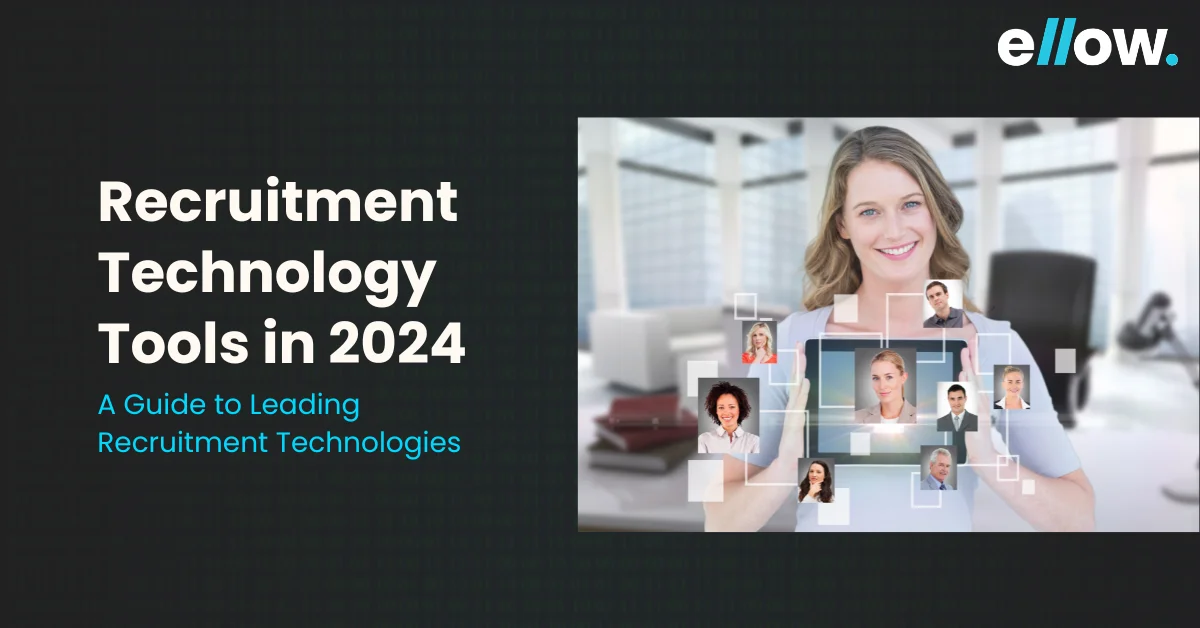Let’s build the future together.
Great ideas need great people. Partner with us to bring your vision to life, or take the first step in your career by joining our team of innovators.

Remember the days of going through endless paper applications? Those days are long behind us. Today’s recruitment scene is a whirlwind of innovation, and 2024 takes it to the next level. We are talking AI scouring the web for hidden gems, social media transforming talent pools, and platforms that streamline hiring like never before.
40% of North American companies used AI primarily for candidate sourcing in their recruitment processes. This trend underscores the growing importance of AI in identifying and attracting top talent efficiently.
Curious how these tech marvels work? We are spilling the beans! This article is your one-stop shop for the essential recruitment tools of 2024. We will dissect how these technologies supercharge the hiring process, highlighting the benefits and, yes, even the challenges they bring.
So, buckle up and get ready to explore the exciting world of modern recruitment. Let us discover the tools you need to dominate the talent hunt in 2024!
Recruitment tools are digital applications that help with hiring new employees. They make the recruitment process easier and more efficient. These tools automate tasks that would otherwise take a lot of time, allowing recruiters to concentrate on finding the best candidates.
They assist in various steps, including finding potential employees, reviewing applications, and getting new hires settled into their roles. Overall, recruitment tools improve the entire hiring process.
Recruitment tools are software or platforms that help companies find and hire the best candidates for job openings. They simplify hiring by providing features like resume screening, job posting, and candidate tracking. These tools are essential in today’s competitive job market, making it easier for recruiters to connect with qualified candidates efficiently. They also offer valuable data and insights to improve hiring strategies and outcomes.
Applicant Tracking Systems (ATS) helps companies manage hiring more efficiently. They automate tasks like posting job ads, sorting resumes, and scheduling interviews. This reduces the time and effort spent on administrative work.
Popular ATS tools include Greenhouse, SmartRecruiters, Lever, Workable, Recruitee, and Bullhorn. Larger companies often use Workday and iCIMS due to their ability to handle high volumes of applications.
By using ATS, recruiters can focus more on engaging with candidates and making better hiring decisions. This technology is crucial for modern HR teams aiming to attract top talent.
Candidate Relationship Marketing (CRM) platforms help recruiters build and maintain connections with potential candidates. These tools post job listings on relevant social media sites, track ad views and applications, and foster a larger talent pool.
Examples include Gem, Avature, Beamery, Jobvite, Yello, and TalentLyft. They specialize in nurturing relationships with candidates long before a specific job opens.
This proactive approach ensures recruiters have a pool of engaged candidates ready when new positions arise. CRM platforms improve long-term recruitment strategies by keeping candidates interested and engaged over time
Candidate Sourcing Software helps recruiters actively find and connect with potential candidates. Instead of waiting for applications, recruiters can search databases and social media to identify qualified individuals.
Tools like Woo, HireEZ, Eightfold.ai, SeekOut, and Visage automate this process, making it easier to locate suitable candidates.
These platforms can search through millions of profiles to find the best match for a job, even reaching out to those who may not be actively looking for new opportunities. This proactive approach ensures recruiters can build a strong pipeline of potential hires.
Candidate Screening Software uses artificial intelligence to evaluate job applications, saving recruiters a lot of time.
These tools automatically review resumes and match candidates to job requirements. For example, Talogy, Trakstar Hire, and Ceridian can quickly identify the best applicants based on predefined criteria.
By automating the initial screening process, these tools help ensure that only the most suitable candidates move forward. This not only speeds up hiring but also improves the chances of finding the right person for the job.
Automated screening makes recruitment more efficient and effective for HR teams.
Interview Software makes the interview process more efficient and effective. Platforms like VidCruiter, Spark Hire, and HireVue allow candidates to record their answers to interview questions at their convenience, which saves time for both the candidate and the recruiter.
These tools support asynchronous video interviews, meaning candidates don’t need to schedule live meetings. Sapia.ai uses artificial intelligence to conduct virtual interviews, which is particularly useful for hiring large numbers of candidates quickly.
By automating and streamlining interviews, these tools help recruiters evaluate more candidates in less time, improving the overall hiring process.
Reference Checking Software automates the tedious process of collecting and verifying references for job candidates. Instead of manually contacting referees, these tools send emails with a link to an online questionnaire.
Referees provide feedback on the candidate’s skills and conduct through this secure website. The software then compiles and analyzes the responses to give a comprehensive overview of the candidate’s past performance.
Examples of reference-checking tools include Zinc, Xref, and Crosschq. This automation saves time for recruiters and ensures a more thorough and unbiased reference-checking process.
Candidate Experience Analytics Platforms help companies understand and improve how job applicants feel about their recruitment process. These tools collect feedback from candidates at different stages, from application to interview.
Platforms like Starred provide insights into what candidates think, allowing companies to identify and fix any issues. They also measure the experience of hiring teams and track the quality of hires.
Additionally, these platforms include metrics for diversity, equity, and inclusion (DEI). By using these insights, companies can enhance their recruitment process, improve their reputation, and attract better talent.
Candidate Assessment Software helps recruiters evaluate the skills and aptitudes of potential hires through various tests and assessments. These tools provide a more dynamic and objective measure of a candidate’s capabilities beyond what is listed on their resume.
Platforms like Testportal, Tazio, and Toggl Hire offer a range of assessments, while HackerRank, Codility, TestGorilla, and CodeSignal are ideal for technical roles.
These solutions streamline the hiring process by identifying the best candidates efficiently, ensuring that only the most qualified individuals move forward in the recruitment process.
Diverse and Inclusive Hiring Software helps reduce biases in recruitment to promote a fair and diverse workplace. These tools anonymize applications by removing names, ages, and photos, allowing recruiters to focus solely on skills and experience.
Platforms like Gap Jumpers and Beapplied analyze recruitment practices to identify and mitigate biases. They also help ensure job ads appeal to a broad audience.
By fostering unbiased hiring processes, these tools contribute to building a more inclusive workforce, benefiting both the company and its employees.
Software for Diverse and Inclusive Hiring aims to eliminate biases in recruitment processes by anonymizing applicant information, focusing solely on skills and experience.
Tools like Gap Jumpers and Beapplied help companies analyze their hiring practices for hidden biases. They examine language in job postings to ensure inclusivity and fairness.
By removing names, ages, and photos from applications, recruiters make decisions solely based on qualifications, promoting diversity. This approach aligns with the growing corporate emphasis on fairness and equity in hiring practices, crucial for attracting a diverse talent pool and enhancing organizational reputation.
Recommended Read: Top AI in Hiring Statistics in 2024
Recruitment technology automates repetitive tasks like resume screening and interview scheduling. This significantly reduces the time required for the hiring process, allowing recruiters to fill positions faster and focus on more strategic activities, ultimately improving overall operational efficiency.
Advanced screening and assessment tools help identify candidates who best fit the job requirements and company culture. These tools use algorithms and data analysis to evaluate skills, experience, and potential, leading to higher-quality hires and reducing the likelihood of mismatched placements.
Recruitment tools streamline the application process, making it more user-friendly and efficient. They improve communication with candidates by providing timely updates and feedback. This enhanced experience increases candidate satisfaction and helps build a positive employer brand.
Recruitment technology provides valuable analytics and insights into the hiring process. These data-driven insights enable companies to make more informed decisions, optimize recruitment strategies, and identify areas for improvement, resulting in more effective and efficient hiring practices.
By automating administrative tasks such as scheduling interviews and managing applications, recruitment tools free up time for recruiters to focus on high-value activities like engaging with top candidates and strategic planning. This increased productivity leads to more successful and efficient hiring processes.
Using the right sourcing tools allows you to create a targeted approach to recruitment. Recruiters can accurately identify job requirements and find the best fit from a wide range of sources.
Sourcing tools enable you to tailor search queries to locate candidates with specific skills and experience. This helps you find top talent who may not actively be looking for a job but are a great fit for your organization.
With a pipeline of pre-vetted candidates, you can fill positions more quickly, reducing the time and expense associated with traditional recruitment methods. This makes sourced candidates more efficient to hire compared to inbound applicants.
Staying ahead requires more than just skill in the world of recruitment, it demands cutting-edge technology. Recruitment tools are no longer a luxury; they are a necessity. These tools streamline the hiring process and enhance the quality of hires, propelling business growth to new heights.
Throughout this article, we have delved into the diverse array of recruitment tools, each designed to tackle different aspects of the recruitment journey. From AI-driven candidate sourcing solutions to platforms that foster seamless team collaboration, these tools are indispensable for modern recruiters.
Enter ellow.io, a game-changer in the recruitment tech space. Ellow.io revolutionizes recruitment by offering a comprehensive, user-friendly platform that streamlines the entire hiring process.
With AI-driven candidate sourcing, seamless team collaboration tools, and data-rich insights, ellow.io empowers recruitment businesses to enhance efficiency, improve hire quality, and stay ahead in the competitive recruitment landscape. Embrace the future of recruitment with ellow.io and transform the way you hire.
Recruitment technology tools in 2024 include advanced applicant tracking systems (ATS), AI-powered resume screening software, candidate relationship management (CRM) systems, video interview platforms, and data analytics tools for better decision-making.
AI-powered resume screening tools automate the process of evaluating resumes, saving recruiters time and ensuring that only the most qualified candidates are shortlisted. These tools use machine learning algorithms to match job requirements with candidate skills and experience accurately.
CRM systems help recruiters manage and nurture relationships with potential candidates. They enable the creation of talent pools, facilitate personalized communication, and improve candidate engagement, leading to a more efficient recruitment process.
Video interview platforms allow recruiters to conduct remote interviews, making the process more flexible and convenient for both parties. They also enable the recording and sharing of interviews with other decision-makers, ensuring a collaborative hiring process.
Data analytics tools provide recruiters with insights into the effectiveness of their recruitment strategies. By analyzing metrics such as time-to-hire, cost-per-hire, and source of hire, recruiters can make data-driven decisions to optimize their processes and improve overall efficiency.

How Top SaaS Companies Build Agile Teams with Remote Developers

How to Hire Vetted Remote Developers in a Hyper-Competitive Market

Top 5 Countries to Hire Remote Developers (and Why)
Please feel free to share your thoughts and we can discuss it over a cup of tea.
Get a quote
How Top SaaS Companies Build Agile Teams with Remote Developers

Six Things to Consider When Hiring Remote Talent

ellow.io enters remote hires market with AI-based screening process